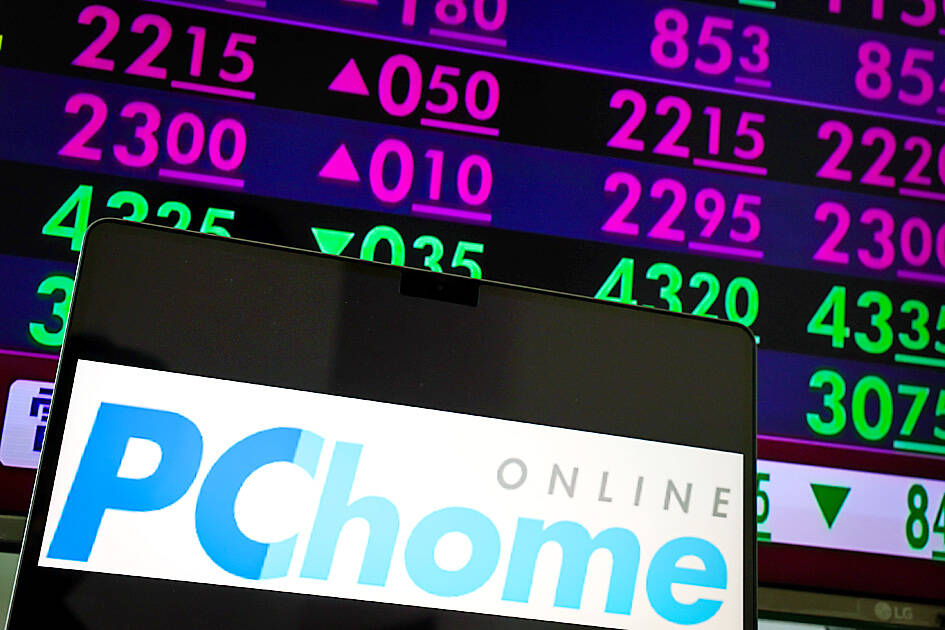PChome Online Inc’s (網路家庭) board of directors on Wednesday approved a private placement from Uni-President Enterprises Corp (統一企業), giving it a 30 percent stake in the e-commerce company.
In the deal, PChome would issue up to 61.69 million new common shares to Uni-President, which would become the largest institutional investor in the company, it said in a regulatory filing.
Uni-President, the nation’s largest food and beverage conglomerate, said in its regulatory filing on Wednesday that its board of directors had agreed to the private placement, which would allow it to secure two seats on PChome’s board.

Photo: CNA
The two companies did not disclose the total amount of the deal, which would be worth NT$1.96 billion (US$61.1 million) based on PChome’s closing share price of NT$31.75 on Wednesday.
The announcement helped push PChome’s share price up by the daily limit in Taipei trading yesterday, closing at NT$34.9, while Uni-President ended up 1.93 percent at NT$89.8, both outperforming the broader market’s 0.61 percent decline.
The private placement is expected to be completed after gaining shareholders’ approval in an extraordinary general meeting on Dec. 19, as well as regulatory approval, PChome said.
Unlike a public offering, an investor’s securities in a private placement are subject to a lockup period. Moreover, a private placement is considered to be more efficient and suitable for the company’s long-term planning while helping increase its working capital, PChome said.
Uni-President said the deal is part of its long-term investment plans. Last month, the company completed the acquisition of an 80 percent stake in Yahoo Taiwan Holdings Ltd’s (雅虎資訊) e-commerce business as it aims to increase sales from online stores and embrace the digital economy.
PChome has seen annual revenue drop in the past two years amid rising competition from rivals, and its cumulative revenue in the first three quarters of this year was down 8.55 percent year-on-year to NT$26.56 billion, the lowest level for the same period over the past six years.
The company has strengthened the sales of daily necessities, optimized its user interface that has been criticized for a long time, and reduced the number of loss-making subsidiaries after Alice Chang (張瑜珊) took over as chief executive officer in August 2022.
However, PChome’s performance remains weak compared with its peers such as Momo.com Inc (富邦媒體), which reported cumulative revenue of NT$79.09 billion in the first three quarters of this year, up 3.51 percent from a year earlier and marking the best result for the same period on record.
PChome reported NT$181.17 million in net losses for the first half of this year, with losses per share of NT$1.28. Prior to the September quarter, the company had posted 10 quarters of losses since the fourth quarter of 2021. In comparison, Momo.com reported NT$1.68 billion in net profit during the first half of the year, with earnings per share of NT$6.98.

Semiconductor business between Taiwan and the US is a “win-win” model for both sides given the high level of complementarity, the government said yesterday responding to tariff threats from US President Donald Trump. Home to the world’s largest contract chipmaker, Taiwan Semiconductor Manufacturing Co (TSMC, 台積電), Taiwan is a key link in the global technology supply chain for companies such as Apple Inc and Nvidia Corp. Trump said on Monday he plans to impose tariffs on imported chips, pharmaceuticals and steel in an effort to get the producers to make them in the US. “Taiwan and the US semiconductor and other technology industries

SMALL AND EFFICIENT: The Chinese AI app’s initial success has spurred worries in the US that its tech giants’ massive AI spending needs re-evaluation, a market strategist said Chinese artificial intelligence (AI) start-up DeepSeek’s (深度求索) eponymous AI assistant rocketed to the top of Apple Inc’s iPhone download charts, stirring doubts in Silicon Valley about the strength of the US’ technological dominance. The app’s underlying AI model is widely seen as competitive with OpenAI and Meta Platforms Inc’s latest. Its claim that it cost much less to train and develop triggered share moves across Asia’s supply chain. Chinese tech firms linked to DeepSeek, such as Iflytek Co (科大訊飛), surged yesterday, while chipmaking tool makers like Advantest Corp slumped on the potential threat to demand for Nvidia Corp’s AI accelerators. US stock

The US Federal Reserve is expected to announce a pause in rate cuts on Wednesday, as policymakers look to continue tackling inflation under close and vocal scrutiny from US President Donald Trump. The Fed cut its key lending rate by a full percentage point in the final four months of last year and indicated it would move more cautiously going forward amid an uptick in inflation away from its long-term target of 2 percent. “I think they will do nothing, and I think they should do nothing,” Federal Reserve Bank of St Louis former president Jim Bullard said. “I think the

SUBSIDIES: The nominee for commerce secretary indicated the Trump administration wants to put its stamp on the plan, but not unravel it entirely US President Donald Trump’s pick to lead the agency in charge of a US$52 billion semiconductor subsidy program declined to give it unqualified support, raising questions about the disbursement of funds to companies like Intel Corp and Taiwan Semiconductor Manufacturing Co (台積電). “I can’t say that I can honor something I haven’t read,” Howard Lutnick, Trump’s nominee for commerce secretary, said of the binding CHIPS and Science Act awards in a confirmation hearing on Wednesday. “To the extent monies have been disbursed, I would commit to rigorously enforcing documents that have been signed by those companies to make sure we get